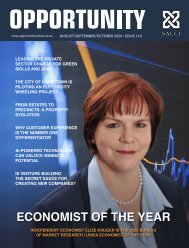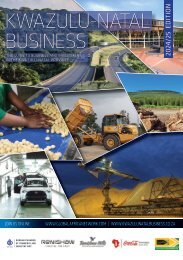Blue Chip Issue 89
Blue Chip Journal – The official publication of FPI. Blue Chip is a quarterly journal for the financial planning industry and is the official publication of the Financial Planning Institute of Southern Africa NPC (FPI), effective from the January 2020 edition. Blue Chip publishes contributions from FPI and other leading industry figures, covering all aspects of the financial planning industry.
Blue Chip Journal – The official publication of FPI. Blue Chip is a quarterly journal for the financial planning industry and is the official publication of the Financial Planning Institute of Southern Africa NPC (FPI), effective from the January 2020 edition. Blue Chip publishes contributions from FPI and other leading industry figures, covering all aspects of the financial planning industry.
You also want an ePaper? Increase the reach of your titles
YUMPU automatically turns print PDFs into web optimized ePapers that Google loves.
CLIENT ENGAGEMENT | Behavioural finance<br />
BLUE<br />
CHIP<br />
in both South Africa and the UK. The title is a pun on Assets Under<br />
Management and the strapline is, “Turning a money business into<br />
a people business”.<br />
Without trying to summarise an entire conference in a short<br />
article, here are some of my notes and take-outs from HUM SA<br />
2023, which will give you a sense of the topics that were discussed:<br />
• When it comes to identifying scams, a clear red flag is when<br />
they promote a supposed “new way to build wealth”. The reality<br />
is that there is no “new way”, and the traditional method still<br />
works beautifully. You simply need to contribute to a diversified<br />
portfolio and give it enough time.<br />
• Behavioural coaching is about understanding the clients’<br />
emotional drivers. This approach has led to different product<br />
recommendations such as advising a wealthy retiree who was<br />
terrified of running out of money to take a guaranteed annuity,<br />
even though there was very little chance that they would run<br />
out of money.<br />
• The most value you can add to a client is simplification.<br />
• Don’t refer to coaching because many people don’t want to be<br />
coached. You need to make it fun.<br />
• When you start working with a client, you’ll be in a “fix phase”<br />
that is fun for both you and your client because you are problemsolving<br />
and implementing solutions. However, once everything<br />
is in place, you’ll move to the “fine phase” where things can<br />
become boring. If you don’t intervene here, there is a risk of<br />
drifting apart. To prevent this, you need to move to the “flourish<br />
phase” where you get new insights and set new goals so that you<br />
return to the “fix phase” and repeat.<br />
numbers, objective analysis and optimising solutions (managing<br />
money), but they are very bad at understanding people’s emotions<br />
(managing people). This means that AI will become a threat to<br />
advisors who manage their clients’ money and will complement<br />
those who manage their clients.<br />
So, whether you choose to join the movement towards behavioural<br />
coaching or whether you want to future-proof your business from<br />
AI – you need to think about turning your money business into a<br />
people business.<br />
To see how far you are on this journey, think back over the last<br />
year and count the number of investor roadshows vs the number<br />
of seminars on the psychology of money that you attended. I<br />
suspect that this will show that most advisors are managing their<br />
clients’ money rather than their clients. That’s okay because the<br />
shift is a process and not an event. So long as you choose to make<br />
the shift from managing money to managing people.<br />
: Fairbairn Consult is a Licensed Financial Service Provider and a member of the Old Mutual Group.<br />
Now let’s consider the impact of AI. In 2017, I completed an online<br />
course through MIT to understand the impact of AI. At the end<br />
of the programme, I wrote an article called “What do artificial<br />
The most value you can add<br />
to a client is simplification<br />
intelligence and robo-advice mean for financial advisors”, which<br />
you can read on my LinkedIn profile. My conclusion was: “We<br />
should see AI as an ‘employee’ that is amazingly efficient, always<br />
consistent, gets smarter every year, never forgets anything,<br />
doesn’t need sleep, is never sick and doesn’t expect an annual<br />
bonus. And one last thing, we need to think about the skills that<br />
advisors will need to thrive in a world where technical financial<br />
planning skills are no longer the primary requirement.”<br />
This may have been truer in 2017 than now, as AI has<br />
jumped significantly since then with the advent of generative<br />
content. These jumps will continue over and over, which<br />
means that AI like Chat GPT 10 will become a genuine threat<br />
to jobs at some point.<br />
Before you despair, let’s think about AI’s strengths and<br />
weaknesses. Machines are very good at research, crunching<br />
Guy Holwill, Chief Executive, Fairbairn Consult<br />
www.bluechipdigital.co.za<br />
85


















